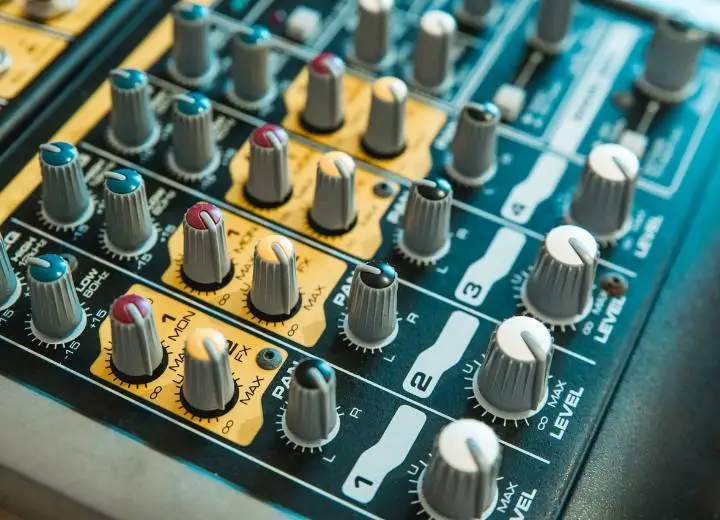
Digital mixers have created controversy among music lovers. It’s about the quality of analog vs digital mixers for recording. Which has more advantages?
In this article, we will analyze and help you better understand them.
The Overview of Analog Mixers
1. Advantages of analog mixers
- The standard signal quality due to the storage technique is in the form of a continuously varying series sinusoid.
- The sound has a high resolution, good sound quality to satisfy the most demanding ears, especially in music.
- Although the machinery system is cumbersome, it is simple. Thus saving a lot of investment costs in machinery.
- With analog recording tapes, it can be cut and spliced.
- Analog is mainly for long-distance transmission. We can find applications of this technology in television, satellite, cellular, and fiber-optic signals.
2. Disadvantages of analog mixers
- Analog audio often contains many unnecessary noises such as wind noise.
- Loss of quality and often limited number of copies to devices. When copying many times it will affect the sound quality.
- Audio signals are affected by oscillations and voltages and are distorted.
- Recording video is often quite complicated by many levels in magnetic tapes such as cassettes or videotapes.
- In broadcasting, this technology has to process signals at many levels of interference and muffled sound.
The Overview of Digital Mixers
1. Advantages of digital mixers
- Can store and process information easily. Once we have recorded a song, we can proceed to modify and handle any errors to make it better, more suitable for listeners.
- Can be stored in various audio storage such as CDs, music players, drives, USB, or some other digital data storage device.
- One can compress audio to reduce the file size and can be viewed and listened to directly on devices such as phones, computers, etc.
- The easy copying of information is not limited to the number of operations and does not affect the sound quality.
- Thanks to the easy and compact storage. It is easier and more cost-effective to distribute audio in general and music in particular over the internet. Before that people used to distribute music by selling physical copies as tapes…
- Original digital sound is preserved.
- Digital sound has been removed all noise.
- Digital sound is not distorted.
2. Disadvantages of digital mixers
- Sound and signal are easily lost because it is in digital form. The audio signal will be affected even if it takes only a few bytes.
- Modern and complex digital audio processing system costs more investment.
- Digital sound is the result of a technological advance that presents the most outstanding advantage in information storage, processing, and reproduction.
What Is The Difference Between Analog and Digital Mixers?
The difference between analog vs digital mixers is that digital signals do not have continuous reassembly. Analog signals are always repeatable, regardless of frequency or amplitude.
We’ll analyze in detail the difference between these two types of mixers through the criteria of sound quality, price, ease to use, and flexibility.
1. Sound quality
The main difference between analog vs digital mixers for recording is the difference in sound.
- Analog mixer
Analog sound means that the sound after is the same as before. The analogy is similar in nature to the signal.
But there will be a difference in the intensity of the sound and the signal. Analog audio is a continuous, analog audio signal usually represented by an X Y (cos, sine) graph.
Analog audio lines are often used for home karaoke speaker systems. From this analog, people invented audio-visual media such as movies, music tapes, videotapes, telecommunication phones, broadcasting, television, etc.
- Digital mixer
Digital audio is a digital signal with 2 levels of audio signals. That uses digital technology to record, store, create, and reproduce sound. By using audio signals that have been encoded as numbers specifically 0 and 1.
Digital audio systems allow easy and convenient compression, storage, processing, and transmission of audio. This signal can be recorded, edited, and changed according to the intended use. With digital audio, we can make multiple copies without sacrificing quality.
2. Easy to use and flexible
In terms of ease of use and flexibility, analog is easier to use than digital.
Analog mixers process signals quickly and neatly through manipulating knobs on the mixer table.
This is also the type of mixer familiar to most audio players today. So the customization and handling are also relatively easy and familiar.
Meanwhile, digital mixers are used quite a lot in large stage sound systems and professional recording studios.
The common point of most sound systems using digital mixers is the use of different instruments and sound sources.
3. Price
On the market today, there are many different prices for mixers with different qualities. But, we can see that digital mixers are difficult to calibrate.
The cost of digital mixers is more than analog products of the same type.
How to choose the right mixer?
To choose the right mixer for recording you need to pay attention to your purposes and needs.
If you are in need of a club sound mixer where different bands play every night, here changes often happen at the last minute. So you should choose analog.
If you are in need of a mixer for touring with a group or a collection of musical groups, for more consistent devices, you should choose a digital mixer.
If you are undecided and still need further assistance, contact our team.
Conclusion
Many people wonder whether digital audio will replace analog audio in the future. Yet, each type has its own advantages and disadvantages, so they will coexist. You will still enjoy music in different ways depending on your preferences.
The article has just provided you a lot of useful information about analog and digital mixer for recording. If you need other information, be happy to contact our team!
